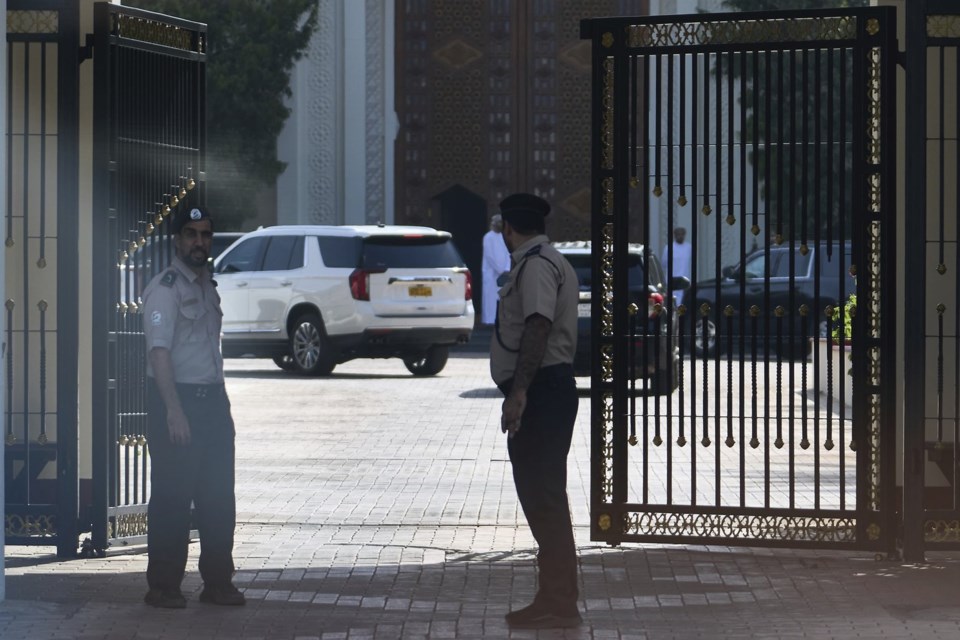MUSCAT, Oman (AP) â Iran and the United States will hold more negotiations next week over , Iranian state television reported Saturday at the end of the first round of talks between the two countries since President Donald Trump returned to the White House.
Iran's state-run broadcaster revealed that U.S. Mideast envoy Steve Witkoff and Iranian Foreign Minister Abbas Araghchi âbriefly spoke" together â the two nations have done that since the Obama administration.
Tehranâs declaration that the two sides spoke face-to-face â even if briefly â suggests the negotiations went well even to Iranian state TV, which long has been controlled by hard-liners.
In a statement released Saturday afternoon, the White House described the discussions as âvery positive and constructive,â while conceding the issues that need to be resolved âare very complicated.â
âSpecial Envoy Witkoffâs direct communication today was a step forward in achieving a mutually beneficial outcome,â the White House said.
Trump told reporters on Air Force One on Saturday while flying to Miami for a UFC event that the talks are âgoing okay.â
âI canât tell you because nothing matters until you get it done so I donât like talking about it but itâs going ok. The Iran situation is going pretty good, I think," he said.
The next round of talks will take place Saturday, April 19, according to the Iranian and American statements.
This first round of talks began at around 3:30 p.m. local. The two sides spoke for over two hours at a location in the outskirts of Muscat, Oman's capital, ending the talks around 5:50 p.m. local time. The convoy believed to be carrying Witkoff returned to Muscat before disappearing into traffic around a neighborhood that is home to the U.S. Embassy.
The stakes of the negotiations couldnât be higher for the two nations . Trump repeatedly has threatened to unleash airstrikes targeting Iranâs nuclear program if a deal isnât reached. Iranian officials increasingly warn that they could pursue a nuclear weapon with their stockpile of uranium enriched to near weapons-grade levels.
Talks took place Saturday afternoon in Oman
Associated Press journalists saw a convoy believed to be carrying Witkoff leave the Omani Foreign Ministry on Saturday afternoon and then speed off into the outskirts of Muscat. The convoy went into a compound and a few minutes later, Iranian Foreign Ministry spokesman Esmail Baghaei wrote on the social platform X that the âindirect talksâ had begun.
Afterward, Araghchi described the meeting as constructive to Iranian state TV, with four rounds of messages exchanged during the indirect portion.
âNeither we nor the other side are interested in fruitless negotiations â so-called âtalks for the sake of talks,â wasting time, or drawn-out, exhausting negotiations,â he said. "Both sides, including the Americans, have said that their goal is also to reach an agreement in the shortest possible time. However, that will certainly not be an easy task.â
That the two men spoke face-to-face satisfied a demand of the Americans. Trump and Witkoff both had described the talks as being âdirect.â
âI think our position begins with dismantlement of your program. That is our position today,â Witkoff told The Wall Street Journal before his trip. âThat doesnât mean, by the way, that at the margin weâre not going to find other ways to find compromise between the two countries.â
He added: âWhere our red line will be, there canât be weaponization of your nuclear capability.â
Araghchi, however, sought to downplay the encounter as âa brief initial conversation, greetings and polite exchangesâ â likely to avoid drawing the anger of hard-liners in Iran.
Badr al-Busaidi, Oman's foreign minister who shuttled between the two sides, said the countries have a âshared aim of concluding a fair and binding agreement.â
âI would like to thank my two colleagues for this engagement, which took place in a friendly atmosphere conducive to bridging viewpoints and ultimately achieving regional and global peace, security and stability,â al-Busaidi wrote on X. âWe will continue to work together and put further efforts to assist in arriving at this goal.â
Sanctions relief and enrichment remain top issues
While the U.S. side can offer sanctions relief for Iranâs beleaguered economy, it remains unclear just how much Iran will be willing to concede. Under the 2015 nuclear deal, Iran could only maintain a small stockpile of uranium enriched to 3.67%. Today, Tehranâs stockpile could allow it to build multiple nuclear weapons if it so chooses and it has some material enriched up to 60%, a short, technical step away from weapons-grade levels. Judging from negotiations since Trump unilaterally withdrew America from the deal in 2018, Iran will likely ask to keep enriching uranium up to at least 20%.
One thing it wonât do is give up its program entirely. That makes the proposal of Israeli Prime Minister Benjamin Netanyahu of a so-called Libyan solution â âyou go in, blow up the facilities, dismantle all the equipment, under American supervision, American executionâ â unworkable.
Iranians including Ayatollah Ali Khamenei have held up what ultimately happened to the late Libyan dictator Moammar Gadhafi, who was killed with his own gun by rebels in the countryâs 2011 Arab Spring uprising, as a warning about what can happen when you trust the United States.
___
Associated Press writer Amir Vahdat in Tehran, Iran, contributed to this report.
___
The Associated Press receives support for nuclear security coverage from and . The AP is solely responsible for all content.
___
Additional AP coverage of the nuclear landscape:
Jon Gambrell, The Associated Press



